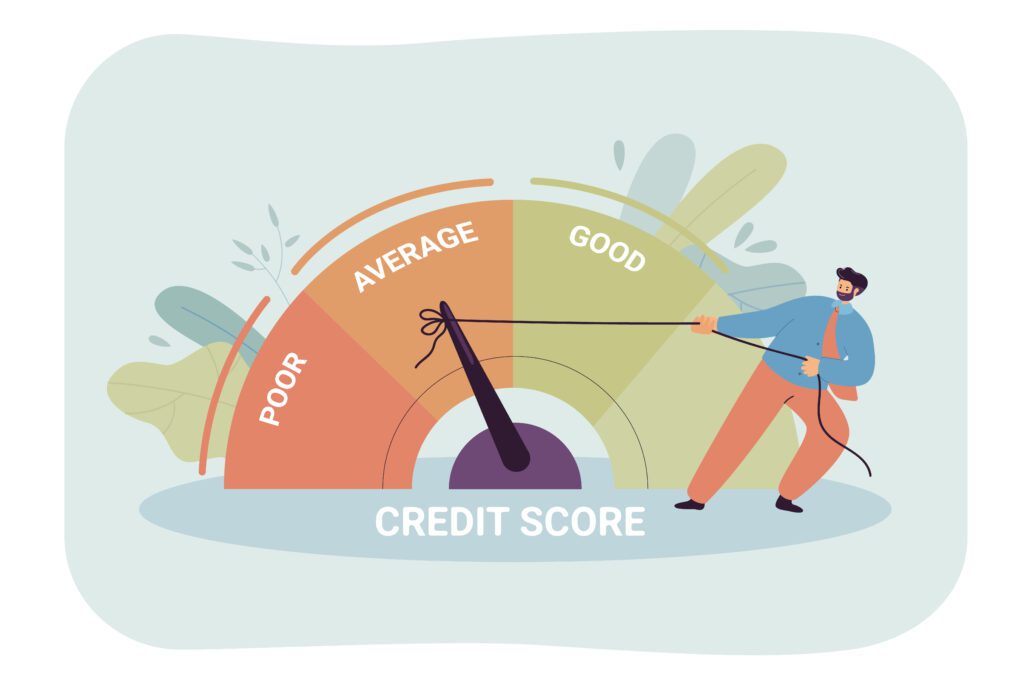We currently live in a world where financial factors, such as credit scores, matter quite a lot. A reflection of your past credit behaviour, your Credit Score is crucial for securing loans, renting apartments, and even landing your dream job.
A good credit score opens doors to an array of opportunities, while a poor one can stand in the way of your financial progress.
So, what exactly is a credit score, and how can you improve yours?
Continue reading the Blog Post to learn more about the Basics of Credit Score and how managing it effectively can take you further up the ladder of Financial success.
Credit Score: A Reflection of Financial Responsibility

This 3-digit is a numerical representation of your creditworthiness,ranging from 300 to 850,shows how promptly you repay debts and how much credit you use. It is used by lenders to assess the risk of lending to you along with determining the interest rates and terms you’ll be offered for loans, credit cards, and other forms of credit.
Now your Credit Score can fall somewhere between the various ranges. Let’s examine these credit score ranges and their implications.

- Excellent Credit (740-850): An excellent credit score indicates a long history of continued responsible credit behaviour. A person is likely to qualify for the most favourable loan terms and interest rates, if they have an excellent credit score.
- Good Credit (670-739): A good credit score suggests that you’re a reliable borrower who has generally handled debt responsibly in the past. You’ll still have access to attractive loan terms and interest rates, though they may not be as low as those offered to borrowers with excellent credit.
- Fair Credit (580-669): A fair credit score indicates that there may be some shortcomings in your credit history, such as late payments or past debts. While you may still qualify for loans and credit cards, you may face higher interest rates and less favourable terms.
- Poor Credit (Below 580): A low credit score indicates a high default risk, which makes it difficult to get approved for credit or even secure favourable loan terms. Before you can access mainstream credit options, you might need to focus on raising your credit score.
Factors that Impact your Credit Score
- Payment History (35%): Probably the most important factor in determining your credit score; It shows lenders how reliably you repay your debts. If you make timely payments on your credit cards, loans, and other bills, your payment history will be positive and your credit score will definitely benefit. However, if you have late payments or defaults, your payment history will be negative and your credit score will suffer.
- Credit Utilisation (30%): Credit Utilisation refers to the amount of available credit you’re using compared to your total credit limit. For example, if your credit limit is ₹10,000 and you have an outstanding balance of ₹3,000, your credit utilisation ratio is 30%. Lenders usually prefer borrowers with low credit utilisation ratios, as it suggests that you can manage your credit responsibly. Aim to keep your credit utilisation below 30% to maintain a good credit score.
- Credit Mix (10%): This factor assesses the diversity of your credit accounts. Having a mix of credit types, such as credit cards, instalment loans, and secured loans, demonstrates your ability to handle different types of credit. A balanced credit mix is considered more favourable than having only one type of credit account.
- Credit Age (15%): This refers to the length of your credit history. The longer you’ve had credit accounts open and managed responsibly, the more positive your credit age will be. This is because a longer credit history shows lenders that you have a track record of reliable credit management.
- Hard Inquiries (10%): A hard inquiry occurs when a lender checks your credit report to evaluate your creditworthiness, typically when you apply for a new loan or credit card. Hard inquiries can temporarily lower your credit score, but the impact is usually minimal and short-lived.
Improving your credit score takes time and dedication and is very often a long-term process, but it’s definitely achievable. Here are some effective strategies that can help enhance your credit score.
Strategies to Enhance Your Credit Score

- Pay Your Bills on Time
Make sure you pay all your bills, including credit cards, loans, and utilities, on time every month. Late payments can seriously damage your credit score.
- Don’t Max Out Your Credit Cards
Only use a small portion of your credit card limit, ideally keeping your credit utilisation below 30%. This shows lenders that you’re not relying too heavily on credit.
- Use Different Types of Credit
Having a mix of credit accounts, such as credit cards and instalment loans, demonstrates your ability to manage different types of debt.
- Keep Your Credit Accounts Open for Longer
The longer you’ve had accounts open, the better for your credit score. Closing old accounts can actually lower your score.
- Don’t Apply for Too Much Credit at Once
Every time you apply for new credit, it counts as a hard inquiry, which can temporarily lower your score. Avoid applying for too much credit in a short period.
- Check Your Credit Report Regularly
Check for errors or inaccuracies in your credit report regularly. If you find any mistakes, dispute them immediately with the credit bureaus.
- Ask for Help If You Need It
If you’re struggling to manage your credit, don’t hesitate to seek help from a credit counsellor or financial advisor.
Conclusion:
Credit score is a crucial indicator of your financial responsibility. Remember, financial well-being is a journey, not a destination. It’s about making smart choices today to secure a brighter financial future for yourself. With patience, perseverance, and sound financial management, you can achieve your financial goals and enjoy the peace of mind that comes with having a healthy credit score.

